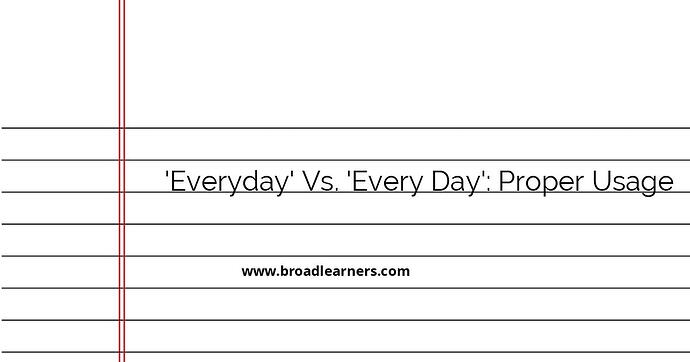Understanding the difference between 'everyday' and 'every day' is essential for clear and precise communication. While they may seem similar, these terms have distinct meanings and functions in the English language. In this article, we will explore the nuances of each term and provide detailed examples for their correct usage.
'Everyday'
The term 'everyday' is an adjective which means 'common,' 'ordinary,' or 'typical.' It is used to describe items, events, or practices that are routine or usual. By functioning as an adjective, 'everyday' modifies a noun, providing additional information about it.
Examples:
- The What:
These are my everyday shoes.
- Explanation:
- In this example, 'everyday' describes the shoes as being suitable for daily wear—indicating that they are not reserved for special occasions.
<dt>The What:</dt>
<dd><blockquote>She prefers <strong>everyday</strong> clothing.</blockquote></dd>
<dt>Explanation:</dt>
<dd>Here, 'everyday' modifies 'clothing,' indicating that the clothing is practical and suitable for regular use, as opposed to being formal or for a special event.</dd>
<dt>The What:</dt>
<dd><blockquote>It's an <strong>everyday</strong> problem.</blockquote></dd>
<dt>Explanation:</dt>
<dd>This example uses 'everyday' to signify that the problem is common or frequently encountered.</dd>
'Every Day'
On the other hand, 'every day' is a phrase made up of two words, an adjective ('every') and a noun ('day'). This phrase indicates a regular occurrence, something that happens each day. Unlike 'everyday,' this phrase acts as an adverbial phrase specifying the frequency of an action.
Examples:
- The What:
I walk to work every day.
- Explanation:
- In this example, 'every day' specifies how often the speaker walks to work—daily.
<dt>The What:</dt>
<dd><blockquote>She reads the newspaper <strong>every day</strong>.</blockquote></dd>
<dt>Explanation:</dt>
<dd>Here, 'every day' indicates that the action of reading the newspaper is part of her daily routine.</dd>
<dt>The What:</dt>
<dd><blockquote>The plant needs watering <strong>every day</strong>.</blockquote></dd>
<dt>Explanation:</dt>
<dd>This phrase is used to convey that watering occurs daily, highlighting the plant’s regular need for water.</dd>
Both 'everyday' and 'every day' have clear roles in written and spoken language. Remembering their differences can greatly enhance your communication skills:
- 'Everyday' (one word) is used when describing something common or typical.
- 'Every day' (two words) signifies routine actions that occur each day.
By understanding these distinctions, individuals can enrich their English proficiency by using these terms accurately and effectively.
Did I miss anything? Respond below
